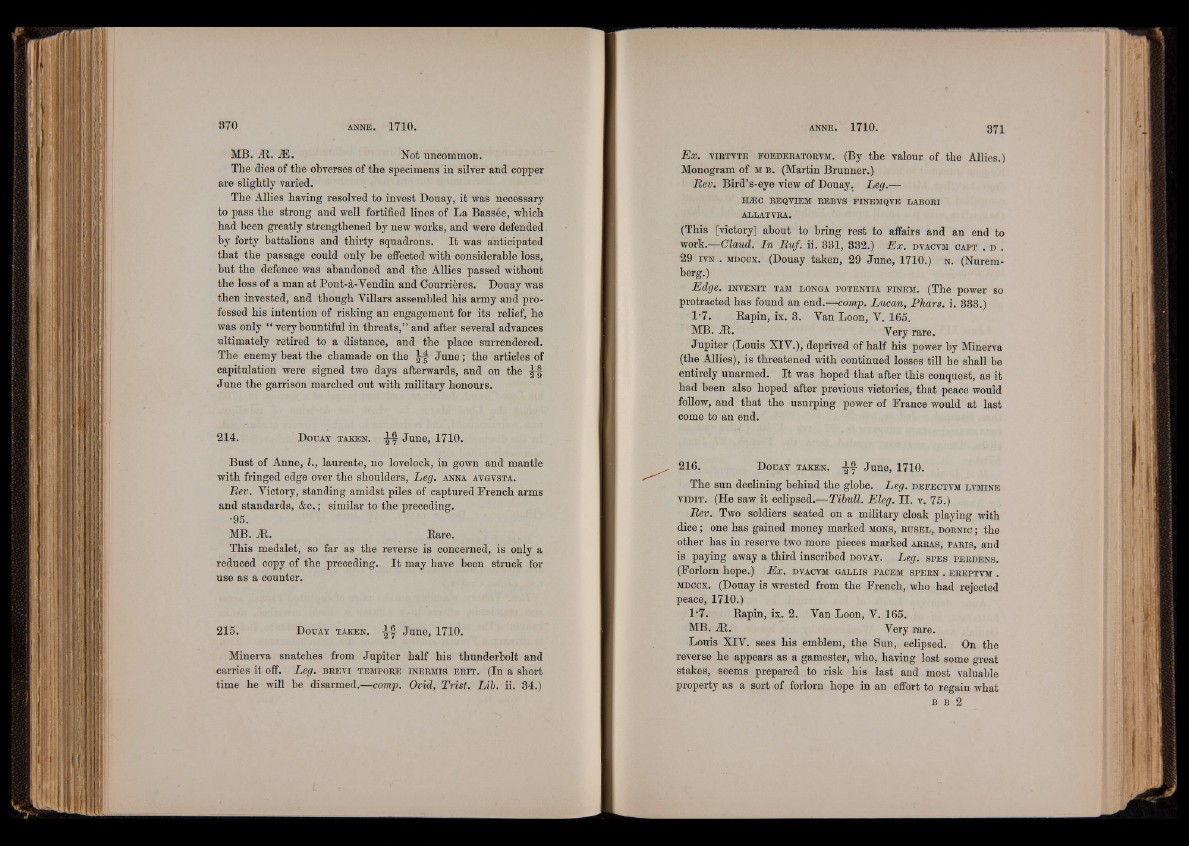
870 ANNE. 1710.
MB. At. M . Not uncommon.
The dies of the obverses of the specimens in silver and copper
are slightly varied.
The Allies having resolved to invest Douay, it was necessary
to pass the strong and well fortified lines of La Bassee, which
had been greatly strengthened by new works, and were defended
by forty battalions and thirty squadrons. It was anticipated
that the passage could only be effected with considerable loss,
hut the defence was abandoned and the Allies passed without
the loss of a man at Pont-a-Vendin and Courrieres. Douay was
then invested, and though Villars assembled his army and professed
his intention of risking an engagement for its relief, he
was only “ very bountiful in threats,” and after several advances
ultimately retired to a distance, and the place surrendered.
The enemy heat the chamade on the ^ June; the articles of
capitulation were signed two days afterwards, and on the
June the garrison marched out with military honours.
214. D ouay t a k e n , y y June, 1710.
Bust of Anne, I., laureate, no lovelock, in gown and mantle
with fringed edge over the shoulders, Leg. anna avgvsta.
Rev. Victory, standing amidst piles of captured French arms
and standards, &c.; similar to the ^preceding.
•95.
MB. At, Bare.
This medalet, so far as the reverse is concerned, is only a
reduced copy of the preceding. It may have been struck for
use as a counter.
215. D ouay t a k e n . June, 1710.
Minerva snatches from Jupiter half his thunderbolt and
carries it off. Leg. b r e v i t em p o r e in e r m is e r i t . (In a short
time he will be disarmed.—comp. Ovid, Trist. Lib. ii. 34.)
ANNE. 1710. 371
Ex. v ir t v t e fo e d e r a t o r v m . (By the valour of the Allies.)
Monogram of mb. (Martin Brunner.)
Rev. Bird’s-eye view of Douay. Leg.—
HA3C REQVIEM REBVS FINEMQVE LABORI
A1LATVRA.
(This [victory] about to bring rest to affairs and an end to
work.— Cla/ud. In Ruf. ii. 331, 332.) Ex. dvacvm c a pt . d .
29 rvN . mdocx. (Douay taken, 29 June, 1710.) n . (Nuremberg.)
Edge, in v e n it tam longa po t e n t ia festem. (The power so
protracted has found an end.—comp. Lucan, Phars. i. 333.)
P7. Rapin, ix. 8. Van Loon, V. 165.
MB. At. ‘ Very rare.
Jupiter (Louis XIV.), deprived of half his power by Minerva
(the Allies), is threatened with continued losses till he shall be
entirely unarmed. It was hoped that after this conquest, as it
had been also hoped after previous victories, that peace would
follow, and that the usurping power of France would at last
come to an end.
216. D ouay t a k e n . June, 1710.
The sun declining behind the globe. Leg. d e f e c t v m lvm in e
v id it . (He saw it eclipsed.— Tibull. Eleg. II. v. 75.)
Rev. Two soldiers seated on a military cloak playing with
dice; one has gained money marked mons, r u s e l , d o rn ic ; the
other has in reserve two more pieces marked a r ra s, p a r is , and
is paying away a third inscribed dovay. Leg. s p e s p e r d e n s .
(Forlorn hope.) Ex. dvacvm g a l l is pa c em s p e r n . e r e p t v m .
mdccx. (Douay is wrested from the French, who had rejected
peace, 1710.)
1’7. Rapin, ix. 2. Van Loon, V. 165.
MB. At. Very rare.
Louis XIV. sees his emblem, the Sun, eclipsed. On the
reverse he appears as a gamester, who, having lost some great
stakes, seems prepared to risk his last and most valuable
property as a sort of forlorn hope in an effort to regain what
B b 2